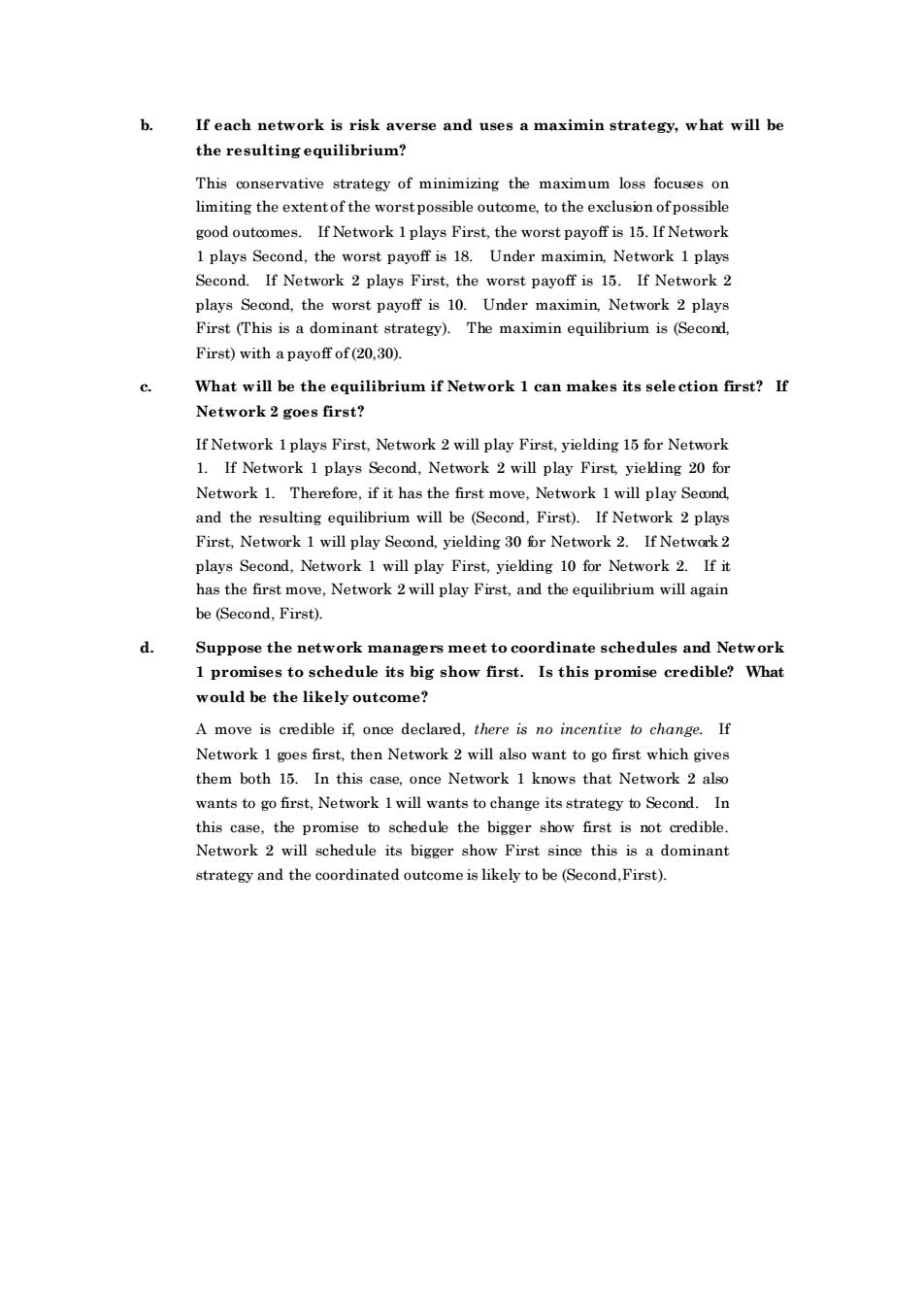正在加载图片...

If each network is risk averse and uses a maximin strategy,what will be the resultingequilibrium? This strategy of minimizing the maximum loss focuseso good outcomes. If Network 1 plays First,the worst payoff is 15.If Network 1 plavs Second.the worst pavoff is 18.Under maximin Network 1 plavs Second.If Network 2 plays First,the worst payoff is 15.If Network 2 plays Second,the worst payoff is 10.Under maximin,Network 2 plays First (Thisa dom The aximin equilibr un is (Se First)with a payoff of(20.30). What will be the equilibrium if Network I can makes its selection first?If Network 2 goes first? If Network 1plays First,Network 2 will play First,yielding 15 for Network 1.If Network 1 plays Second,Network 2 will play First.yielding 20 for Network 1.Therefore,if it has the first move,Network 1will play nd the ing equilibrium will be Second,Fir If N First,Network 1 will play Second,yielding 30 for Network 2.If Network plays Second,Network 1 will play First,yielding 10 for Network 2.If it has the first move,Network 2 will play First,and the equilibrium will again be (Second.First). Suppose the network managers meet to coordinate schedules and Network mises to schedule its big show first.Is this promise credible?What would be the likely outcome? A move is credible if,once declared,there is no incentive to change.If Network I goes first.then Network 2 will also want to go first which gives them both 15.In this case,once Network 1 knows that Network 2 also wants to go first.Network 1 will wants to change its strategy to Second.In this case,the promise to schedule the bigg show first is not redibhk Network 2 schedule its bigger show Firs strategy and the coordinated outcome is likely to be(Second,First). b. If each network is risk averse and uses a maximin strategy, what will be the resulting equilibrium? This conservative strategy of minimizing the maximum loss focuses on limiting the extent of the worst possible outcome, to the exclusion of possible good outcomes. If Network 1 plays First, the worst payoff is 15. If Network 1 plays Second, the worst payoff is 18. Under maximin, Network 1 plays Second. If Network 2 plays First, the worst payoff is 15. If Network 2 plays Second, the worst payoff is 10. Under maximin, Network 2 plays First (This is a dominant strategy). The maximin equilibrium is (Second, First) with a payoff of (20,30). c. What will be the equilibrium if Network 1 can makes its selection first? If Network 2 goes first? If Network 1 plays First, Network 2 will play First, yielding 15 for Network 1. If Network 1 plays Second, Network 2 will play First, yielding 20 for Network 1. Therefore, if it has the first move, Network 1 will play Second, and the resulting equilibrium will be (Second, First). If Network 2 plays First, Network 1 will play Second, yielding 30 for Network 2. If Network 2 plays Second, Network 1 will play First, yielding 10 for Network 2. If it has the first move, Network 2 will play First, and the equilibrium will again be (Second, First). d. Suppose the network managers meet to coordinate schedules and Network 1 promises to schedule its big show first. Is this promise credible? What would be the likely outcome? A move is credible if, once declared, there is no incentive to change. If Network 1 goes first, then Network 2 will also want to go first which gives them both 15. In this case, once Network 1 knows that Network 2 also wants to go first, Network 1 will wants to change its strategy to Second. In this case, the promise to schedule the bigger show first is not credible. Network 2 will schedule its bigger show First since this is a dominant strategy and the coordinated outcome is likely to be (Second,First)